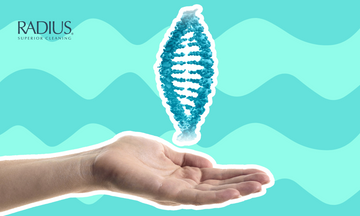At RADIUS, we believe in the power of education when it comes to maintaining optimal oral health. One topic that often sparks curiosity and questions is the role of genetics in dental health. Many people wonder: Can genetics influence the health of our teeth and gums? In this blog, we'll explore the fascinating connection between genetics and dental health and provide you with essential information to help you understand this complex relationship.
Understanding Genetics and Dental Health
Genetics plays a significant role in determining various aspects of our dental health, including the size and shape of our teeth, susceptibility to certain oral health conditions, and even our risk of developing gum disease. While environmental factors like diet and oral hygiene habits also play a crucial role, our genetic makeup can predispose us to certain dental issues.
Tooth Size and Shape
Have you ever noticed that some people have larger or smaller teeth than others? This variation in tooth size and shape is partly determined by genetics. For example, some individuals may inherit genes that predispose them to larger or smaller teeth, which can affect their overall smile aesthetics and oral function.
Susceptibility to Tooth Decay
While everyone is susceptible to tooth decay to some extent, some people may have genetic factors that make them more prone to cavities. These genetic predispositions can include variations in the structure of tooth enamel, the composition of saliva, and the ability to metabolize sugars and carbohydrates.
Risk of Gum Disease
Gum disease, also known as periodontal disease, is a common oral health condition that can range from mild gum inflammation to severe tissue and bone damage. Genetics can influence an individual's susceptibility to gum disease, with certain genetic variations increasing the risk of developing this condition.
Tips for Maintaining Dental Health
While genetics may influence our dental health to some extent, there are steps we can take to maintain optimal oral health regardless of our genetic predispositions. Here are some essential tips to keep in mind:
-
Brush Twice a Day: Brushing your teeth twice a day with a fluoride toothpaste like the Mint Aloe Toothpaste from RADIUS helps remove plaque and bacteria, reducing the risk of cavities and gum disease.
-
Floss Daily: Flossing daily helps remove food particles and plaque from between the teeth and along the gumline, where toothbrushes can't reach. Choose a high-quality dental floss like the Natural Silk Floss from RADIUS for effective plaque removal and gentle cleaning.
-
Visit Your Dentist Regularly: Regular dental check-ups and cleanings are essential for maintaining good oral health. Your dentist can identify and address any issues early on, preventing them from becoming more serious problems down the road.
-
Eat a Balanced Diet: A diet rich in fruits, vegetables, whole grains, and lean proteins provides essential nutrients for healthy teeth and gums. Limit sugary and acidic foods and beverages, as they can contribute to tooth decay and erosion.
-
Avoid Tobacco Products: Smoking and using tobacco products increase the risk of gum disease, tooth decay, and oral cancer. If you smoke or use tobacco, consider quitting to improve your oral and overall health.
Conclusion
While genetics can influence our dental health to some degree, adopting good oral hygiene habits and making healthy lifestyle choices can help mitigate any genetic predispositions. By brushing and flossing regularly, visiting your dentist for check-ups, and maintaining a balanced diet, you can support your dental health and enjoy a beautiful smile for years to come. At RADIUS, we're committed to providing high-quality oral care products to help you achieve and maintain optimal oral health, regardless of your genetic makeup.

